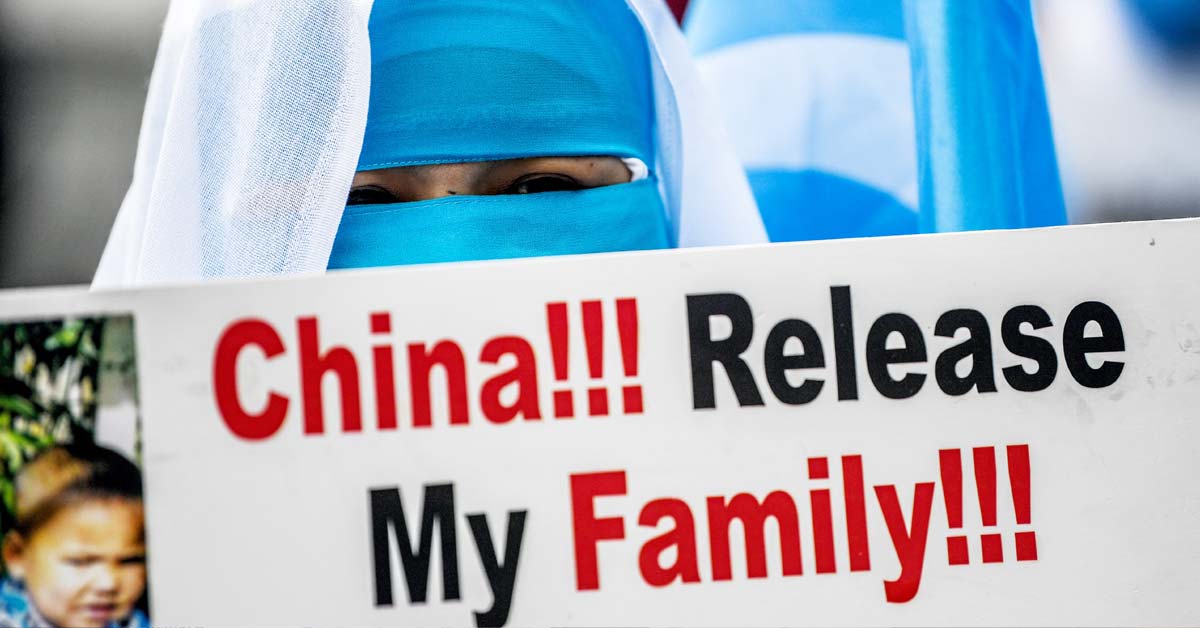Qelbinur Sedik was making breakfast when the video call came, and the sight of her sister's name made her nervous. Many months had passed since the two had spoken. In fact, many months had passed since Sedik had spoken to any of her family in China.
Sedik was in the kitchen of her temporary home in the Netherlands, where she shared a room with several other refugees, mostly from Africa. Two weeks earlier, she and three other women had spoken to the media for a story about alleged rape and torture in China's secretive detention camps in the Xinjiang region, where Sedik worked as a camp teacher.
Now her sister was calling.
She hit answer, but when the picture appeared it wasn't her sister on the screen, it was a policeman from her hometown in Xinjiang.
"What are you up to Qelbinur?" he said. "Who are you with?"
This was not the first time the officer had called from her sister's phone. This time, Sedik took a screenshot. When he heard the sound it made, the officer removed his numbered police jacket, Sedik said. She took another screenshot.
'You Must Think Very Carefully'
In conversations with the media over the past few weeks, 22 people who have left Xinjiang to live abroad described a pattern of threats, harassment, and public character attacks they said were designed to deter them from speaking out about alleged human rights abuses back home.
According to United Nations (UN) estimates, China has detained more than a million Uighurs and other Muslims in camps in Xinjiang. The Chinese state has been accused of an array of abuses there including forced labour, sterilisation, torture, rape, and genocide. China denies those charges, saying its camps are "re-education" facilities for combatting terrorism.
Among the few who have fled Xinjiang and spoken publicly, many have received a call like the one to Sedik that morning – from a police officer or government official at their family home, or from a relative summoned to a police station. Sometimes the calls contain vague advice to consider the welfare of their family in Xinjiang, sometimes direct threats to detain and punish relatives.
Others have been publicly smeared in press conferences or state media videos; or been subjected to barrages of messages or hacking attempts directed at their phones. (Last week, Facebook said that it had discovered "an extremely targeted operation" emanating from China to hack Uyghur activists abroad.)
Some of those who spoke to the media – from the United States (US), United Kingdom (UK), Australia, Norway, the Netherlands, Finland, Germany, and Turkey – provided screenshots of threatening WhatsApp, WeChat and Facebook messages; others described in detail what had been said in phone and video calls. Everyone described some form of detention or harassment of their family members in Xinjiang by local police or state security officials.
"He said, 'You must bear in mind that all your family and relatives are with us. You must think very carefully about that fact’,” explained Sedik.
"He stressed that several times, then he said, 'You have been living abroad for some time now, you must have a lot of friends. Can you give us their names?'”
When she refused, the officer put Sedik's sister on the call, she said, and her sister shouted at her, 'Shut up! You should shut up from now on!', followed by a string of insults.
"At that point I couldn't control my emotions," Sedik said. "My tears flowed."
Before the officer hung up, Sedik said, he told her several times to go to the Chinese embassy so the staff there could arrange her safe passage back to China – a common instruction in these kinds of calls.
"This country opens its arms to you," he said.
Misogyny As A Communication Style
Reports of this type of intimidation are not new, but Uighurs activists say China has become more aggressive in response to growing outrage over alleged rights abuses in Xinjiang. The Chinese government has gone on the attack in public in recent weeks, directing a slew of misogynistic abuse specifically at women who have spoken up about alleged sexual abuse.
At recent press conferences, China's foreign ministry spokesperson Wang Wenbin and Xinjiang official Xu Guixiang held up pictures of women who gave first-hand accounts of sexual assault in detention camps and called them "liars"; said one was "morally depraved" and of "inferior character"; and accused another of adultery. One woman was branded a "bitch of bad moral quality" by a former husband in what appeared to be a staged video put out by state media; another was called a "scumbag" and "child abuser" by a Chinese official.
"We have these various women coming forward and telling very credible stories about how they've been abused," said James Millward, a professor of Chinese history at Georgetown University. "And the response shows a complete tone deafness and misunderstanding of how sexual assault and sexual trauma is now being understood and treated now.”
Another common form of harassment described by those who spoke to the media was pressure to spy on fellow Uighurs and organisations that scrutinise China, often in return for contact with family, guarantees of relatives' safety, or access to visas or passports. – BBC
Related Articles:
